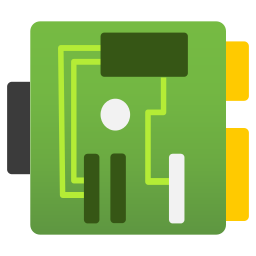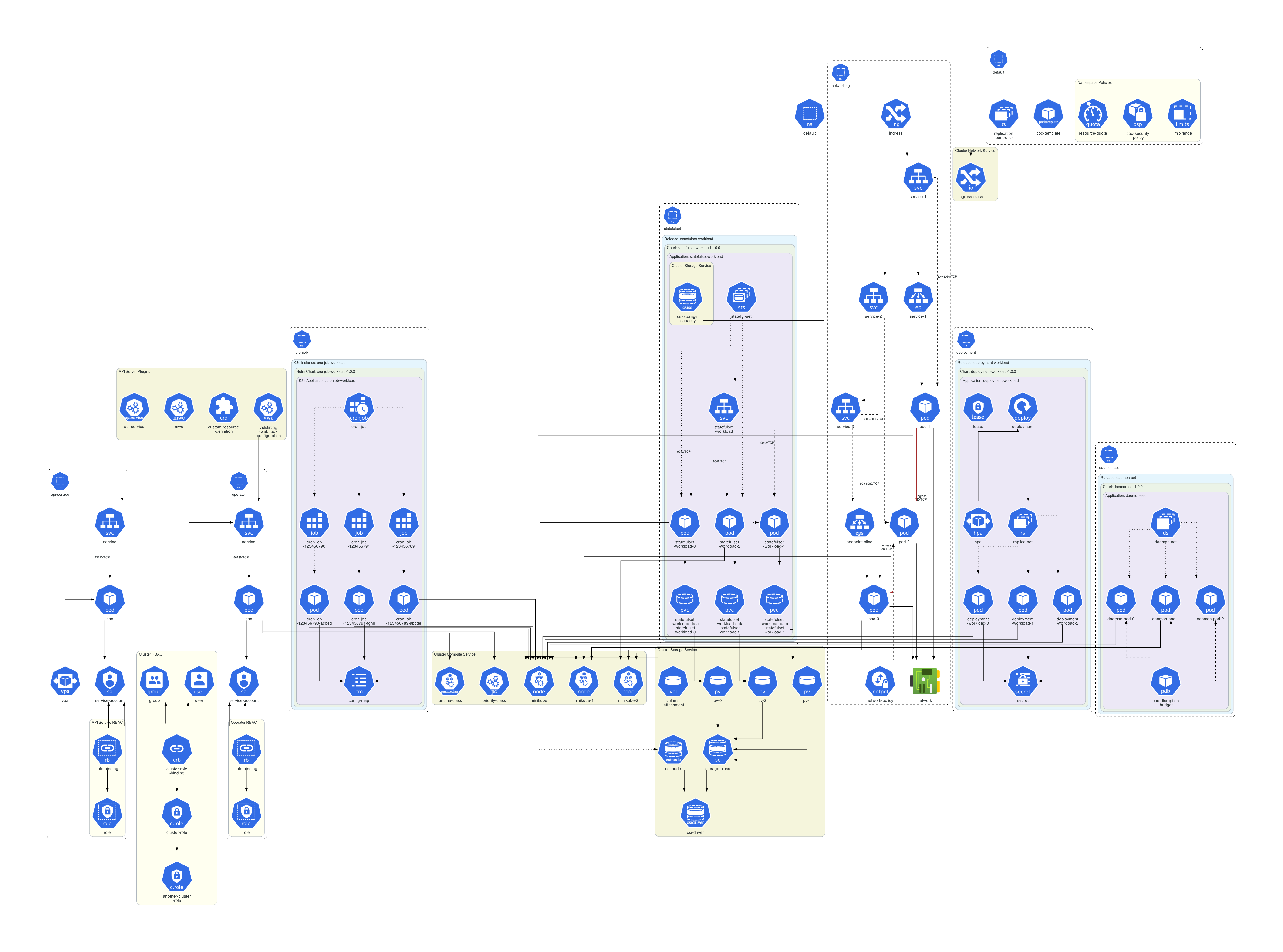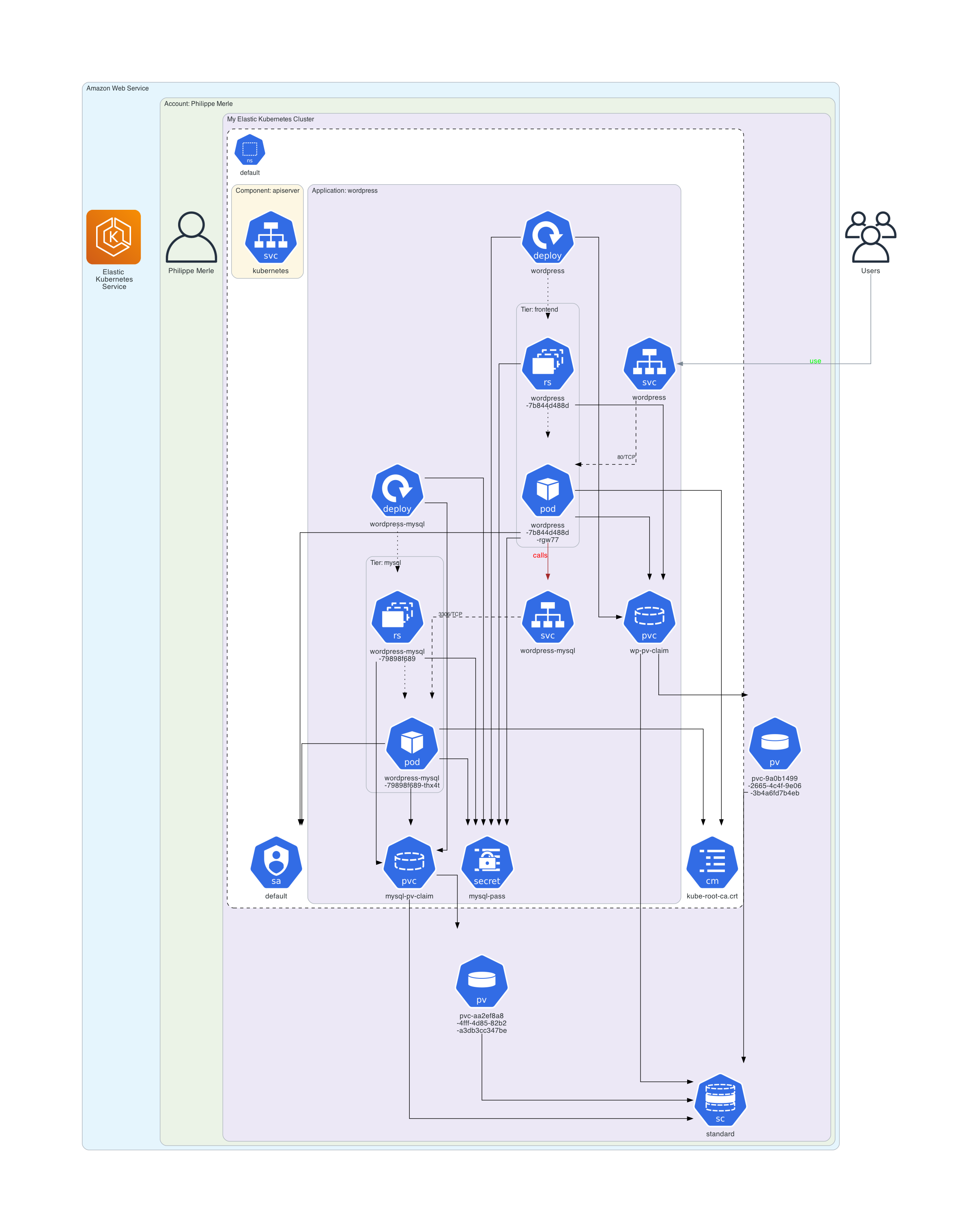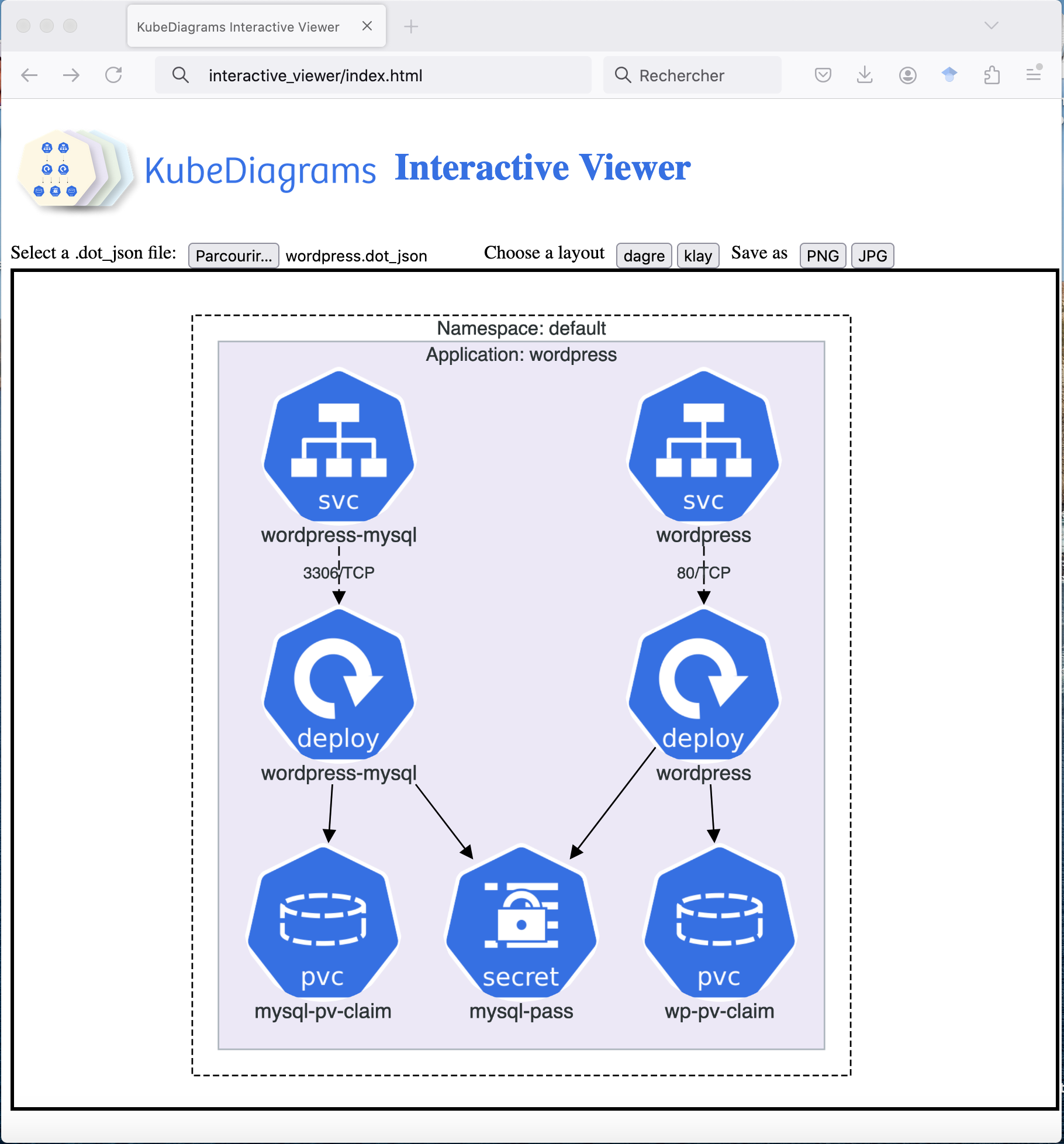Generate Kubernetes architecture diagrams from Kubernetes manifest files, kustomization files, Helm charts, helmfile descriptors, and actual cluster state.
There are several tools to generate Kubernetes architecture diagrams, see here for a detailed list. Compared to these existing tools, the main originalities of KubeDiagrams are the support of:
- most of all Kubernetes built-in resources,
- any Kubernetes custom resources,
- customizable resource clustering,
- any Kubernetes resource relationships,
- declarative custom diagrams,
- an interactive diagram viewer,
- main input formats such as Kubernetes manifest files, customization files, Helm charts, helmfile descriptors, and actual cluster state,
- main output formats such as DOT, GIF, JPEG, PDF, PNG, SVG, and TIFF,
- a very large set of examples.
KubeDiagrams is available as a Python package in PyPI, a container image in DockerHub, a kubectl plugin, a Nix flake, and a GitHub Action, see here for more details.
An Online KubeDiagrams Service is freely available at https://kubediagrams.lille.inria.fr/.
Read Real-World Use Cases and What do they say about it to discover how KubeDiagrams is really used and appreciated.
Try it on your own Kubernetes manifests, Helm charts, helmfiles, and actual cluster state!
Architecture diagram for official Kubernetes WordPress tutorial manifests:

Architecture diagram for official Kubernetes ZooKeeper tutorial manifests:
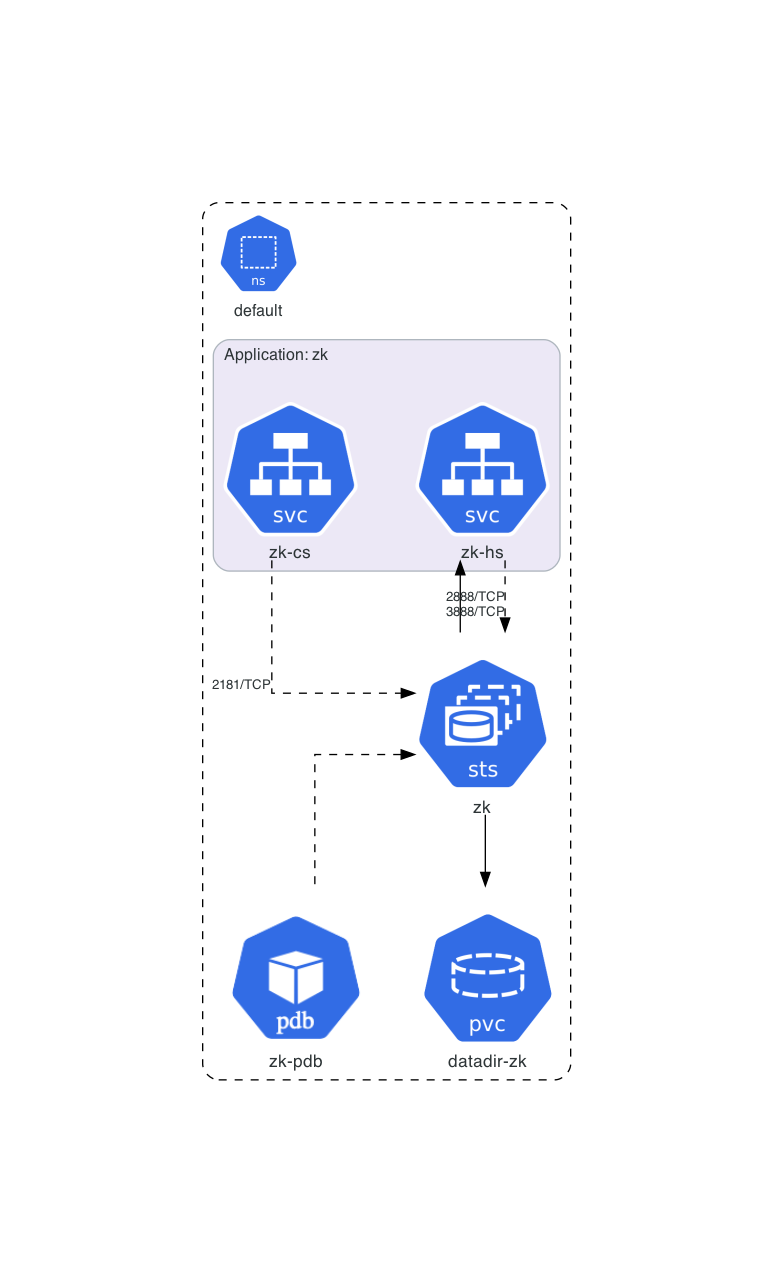
Architecture diagram of a deployed Cassandra instance:

Architecture diagram for Train Ticket:A Benchmark Microservice System:

Architecture diagram of the Minikube Ingress Addon:
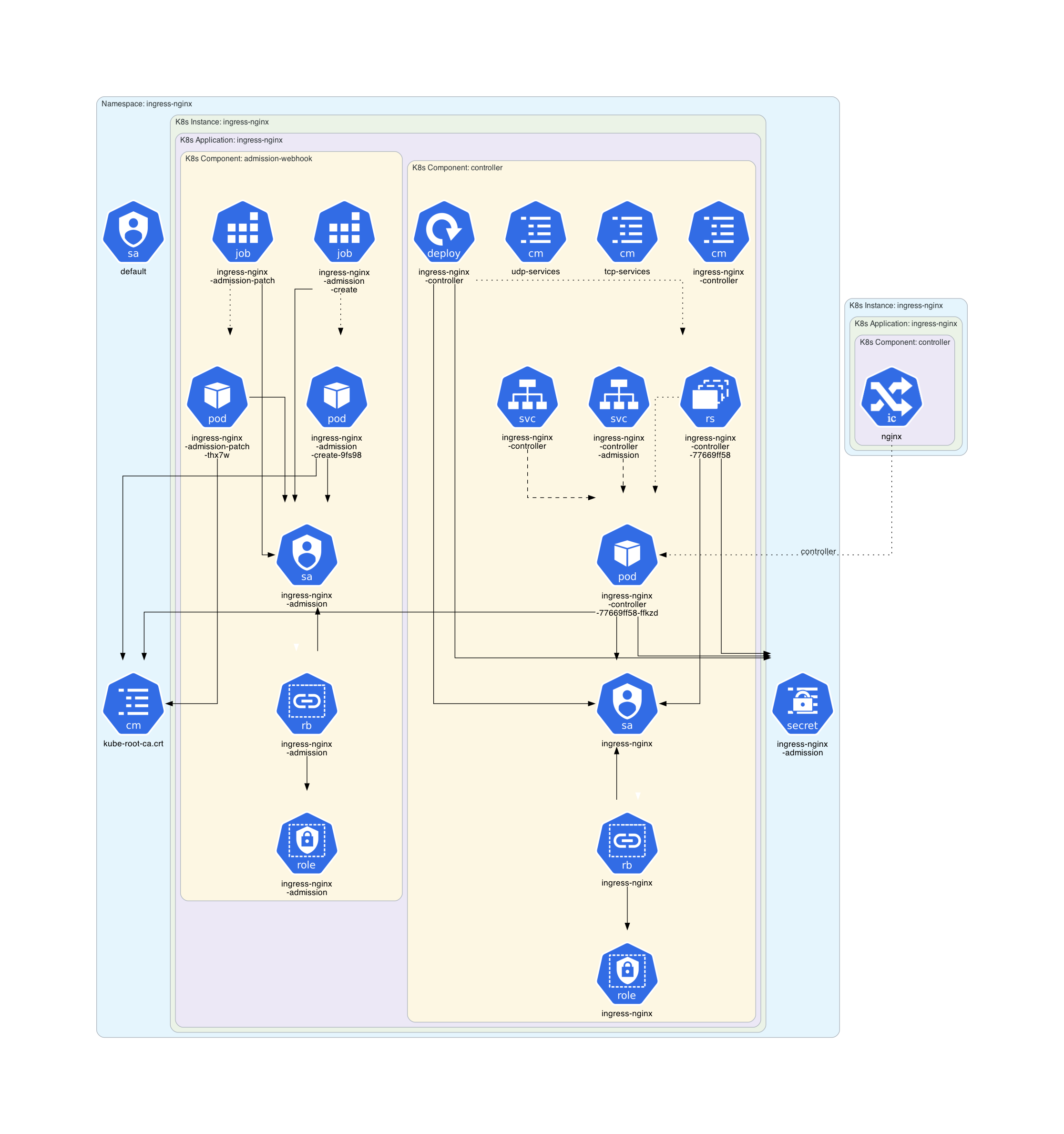
Architecture diagram for the Kube Prometheus Stack chart:

Architecture diagram for free5gc-k8s manifests:

Architecture diagram for open5gs-k8s manifests:

Architecture diagram for the Towards5GS-helm chart:

Architecture diagram for a deployed CronJob instance:
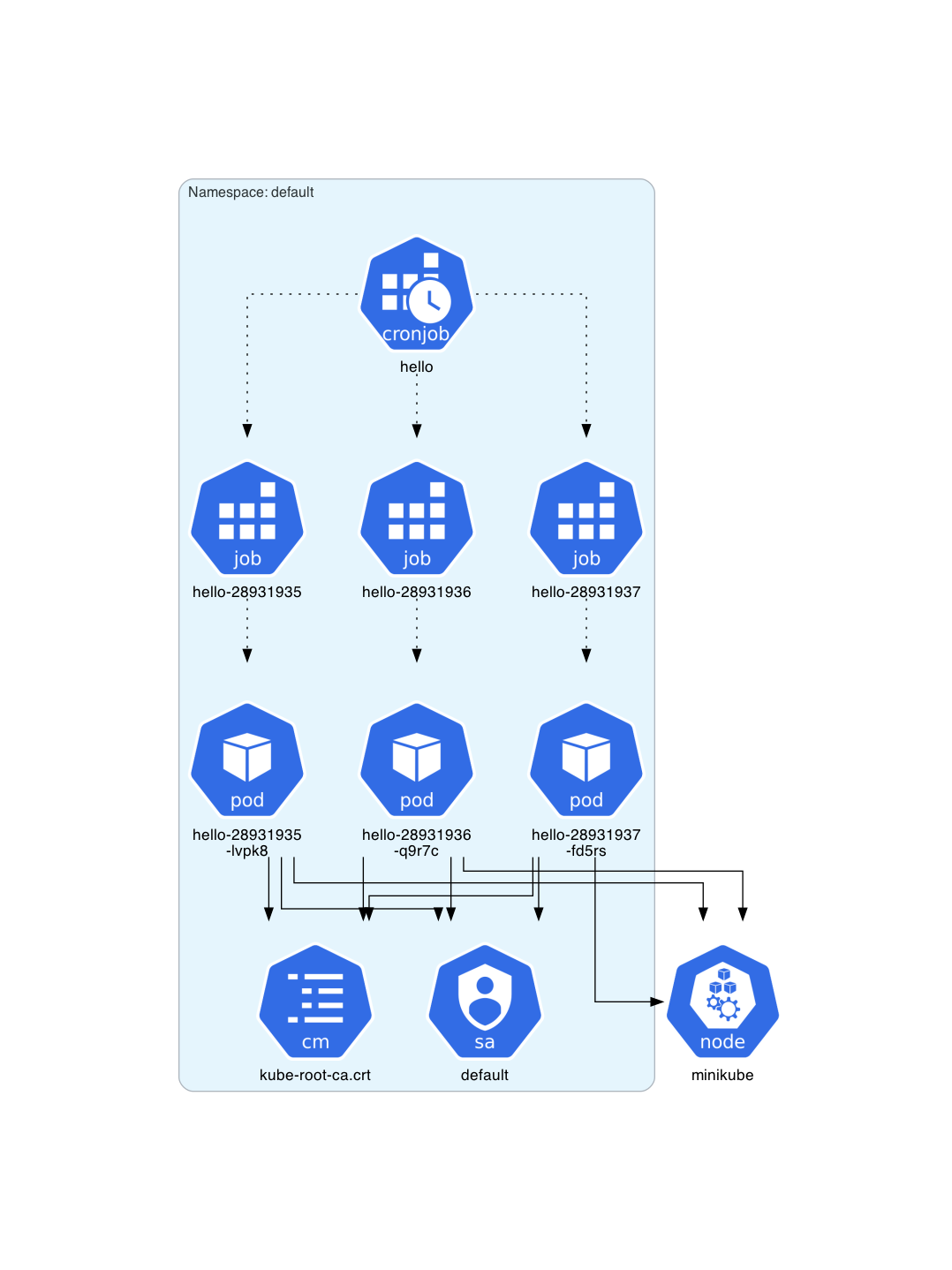
Architecture diagram for NetworkPolicy resources: 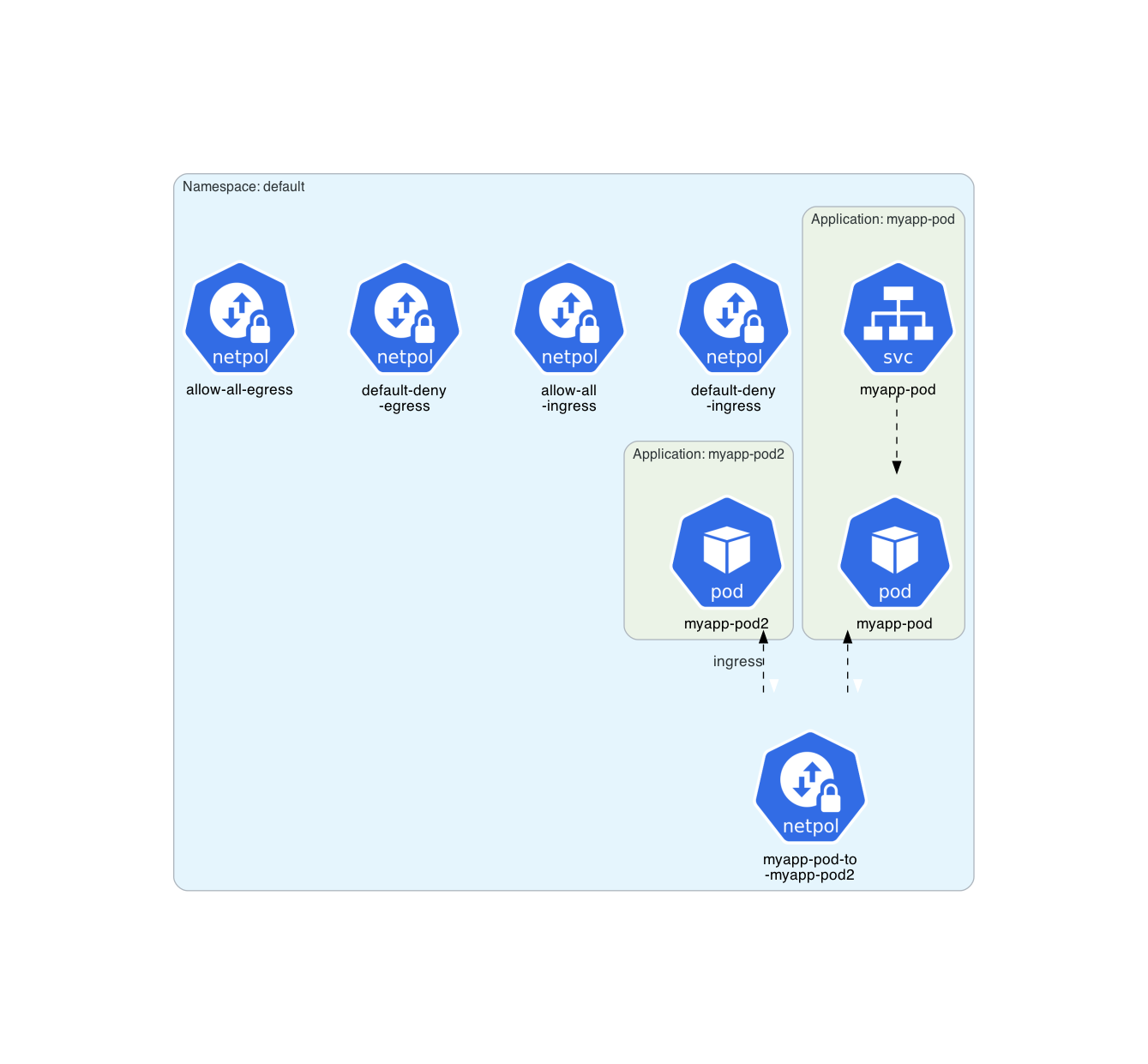
Architecture diagram for an Argo CD example:
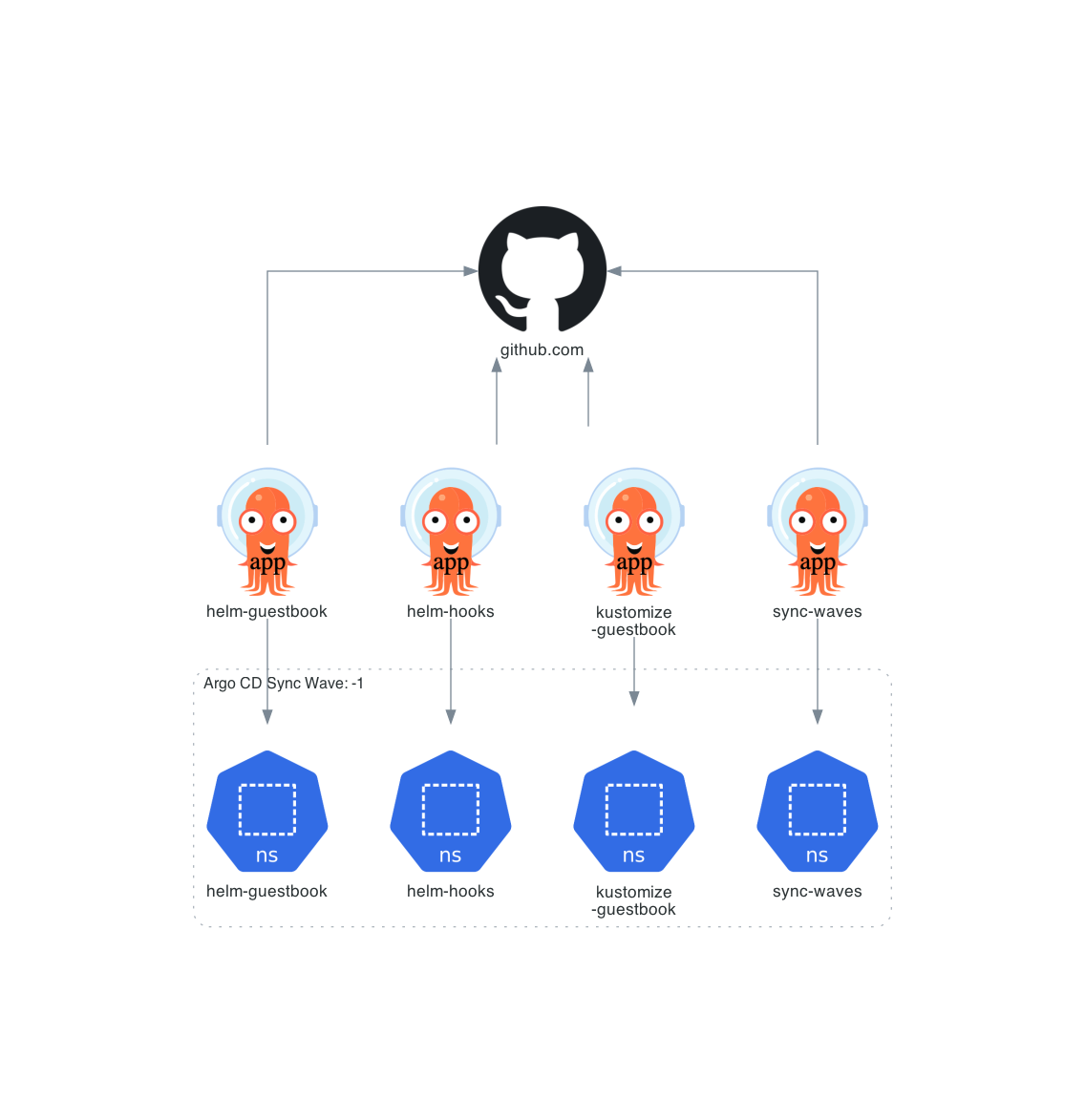
Architecture diagram for an Argo Events example:

Many other architecture diagrams are available into examples/.
- Bank of Anthos
- DeathStarBench
- Official Kubernetes WordPress tutorial
- Official Kubernetes ZooKeeper tutorial
- Official Kubernetes Cassandra tutorial
- Online Boutique
- OpenTelemetry Demo
- TeaStore
- Train Ticket
- free5gc-k8s
- docker-open5gs
- Gradiant 5G Charts
- open5gs-k8s
- OpenAirInterface 5G Core Network
- Towards5GS-helm
Following software must be installed:
Following command installs KubeDiagrams and all its Python dependencies, i.e., PyYAML and Diagrams.
# using pip (pip3)
pip install KubeDiagrams
Alternatively, you can install via Nix:
nix shell github:philippemerle/KubeDiagramsKubeDiagrams container images are available in Docker Hub. You can download the latest container image via:
docker pull philippemerle/kubediagramsYou can start directly from source:
# clone the KubeDiagrams repository
git clone https://github.com/philippemerle/KubeDiagrams.git
# install required Python packages
pip install PyYAML diagrams
# make KubeDiagrams commands available into $PATH
PATH=$(pwd)/KubeDiagrams/bin:$PATHTo use KubeDiagrams from Windows operating system, only the container image is supported currently.
Note
Any contribution would be welcome to translate KubeDiagrams' Unix-based scripts to Windows-based scripts.
KubeDiagrams provides two commands: kube-diagrams and helm-diagrams.
kube-diagrams generates a Kubernetes architecture diagram from one or several Kubernetes manifest files.
kube-diagrams -h
usage: kube-diagrams [-h] [-o OUTPUT] [-f FORMAT] [-c CONFIG] [-v] [--without-namespace] filename [filename ...]
Generate Kubernetes architecture diagrams from Kubernetes manifest files
positional arguments:
filename the Kubernetes manifest filename to process
options:
-h, --help show this help message and exit
-o, --output OUTPUT output diagram filename
-f, --format FORMAT output format, allowed formats are dot, dot_json, gif, jp2, jpe, jpeg, jpg, pdf, png, svg, tif, tiff, set to png by default
--embed-all-icons embed all icons into svg or dot_json output diagrams
-c, --config CONFIG custom kube-diagrams configuration file
-n, --namespace NAMESPACE
visualize only the resources inside a given namespace
-v, --verbose verbosity, set to false by default
--without-namespace disable namespace cluster generationExamples:
# generate a diagram from a manifest
kube-diagrams -o cassandra.png examples/cassandra/cassandra.yml
# generate a diagram from a kustomize folder
kubectl kustomize path_to_a_kustomize_folder | kube-diagrams - -o diagram.png
# generate a diagram from a helmfile descriptor
helmfile template -f helmfile.yaml | kube-diagrams - -o diagram.png
# generate a diagram from the actual default namespace state
kubectl get all -o yaml | kube-diagrams -o default-namespace.png -
# generate a diagram of all workload and service resources from all namespaces
kubectl get all --all-namespaces -o yaml | kube-diagrams -o all-namespaces.png -You can use KubeDiagrams as a kubectl plugin as well for a more integrated Kubernetes workflow. This allows you to run commands like:
kubectl diagrams all -o diagram.pngTo enable this, simply symlink or copy the kubectl-diagrams script onto your $PATH:
ln -s $(which kubectl-diagrams) /usr/local/bin/kubectl-diagramsNote
You will also already need kube-diagrams on your $PATH as well for this to work.
You can alternatively install it via Nix:
nix shell github:philippemerle/KubeDiagrams#kubectl-diagramshelm-diagrams generates a Kubernetes architecture diagram from an Helm chart.
Usage: helm-diagrams <helm-chart-url> [OPTIONS] [FLAGS]
A script to generate a diagram of an Helm chart using kube-diagrams.
Options:
-o, --output <file> Specify the output file for the diagram
-f, --format <format> Specify the output format (e.g., png, svg)
--embed-all-icons Embed all icons into svg or dot_json output diagrams
-c, --config <file> Specify the custom kube-diagrams configuration file
-h, --help Display this help message
Any flag supported by helm template, e.g.:
-g, --generate-name Generate the name (and omit the NAME parameter)
--include-crds Include CRDs in the templated output
-l, --labels stringToString Labels that would be added to release metadata. Should be divided by comma. (default [])
--name-template string Specify template used to name the release
--set stringArray Set values on the command line (can specify multiple or separate values with commas: key1=val1,key2=val2)
--set-file stringArray Set values from respective files specified via the command line (can specify multiple or separate values with commas: key1=path1,key2=path2)
--set-json stringArray Set JSON values on the command line (can specify multiple or separate values with commas: key1=jsonval1,key2=jsonval2)
--set-literal stringArray Set a literal STRING value on the command line
--set-string stringArray Set STRING values on the command line (can specify multiple or separate values with commas: key1=val1,key2=val2)
-f, --values strings Specify values in a YAML file or a URL (can specify multiple)
--version string Specify a version constraint for the chart version to use. This constraint can be a specific tag (e.g. 1.1.1) or it may reference a valid range (e.g. ^2.0.0). If this is not specified, the latest version is used
Examples:
helm-diagrams https://charts.jetstack.io/cert-manager -o diagram.png
helm-diagrams https://charts.jetstack.io/cert-manager --set crds.enabled=true -o cert-manager.png
helm-diagrams oci://ghcr.io/argoproj/argo-helm/argo-cd -f svg
helm-diagrams --helpNote
helm-diagrams requires that the helm command was installed.
Examples:
# generate a diagram for the Helm chart 'cert-manager' available in HTTP repository 'charts.jetstack.io'
helm-diagrams https://charts.jetstack.io/cert-manager
# generate a diagram for the Helm chart 'argo-cd' available in OCI repository 'ghcr.io'
helm-diagrams oci://ghcr.io/argoproj/argo-helm/argo-cd
# generate a diagram for the Helm chart 'some-chart' available locally
helm-diagrams some-path/some-chart
KubeDiagrams images are available in Docker Hub.
# For usage with Podman, replace 'docker' by 'podman' in the following lines.
# generate a diagram from a manifest
docker run -v "$(pwd)":/work philippemerle/kubediagrams kube-diagrams -o cassandra.png examples/cassandra/cassandra.yml
# generate a diagram from a kustomize folder
kubectl kustomize path_to_a_kustomize_folder | docker run -v "$(pwd)":/work -i philippemerle/kubediagrams kube-diagrams - -o diagram.png
# generate a diagram from a helmfile descriptor
helmfile template -f helmfile.yaml | docker run -v "$(pwd)":/work -i philippemerle/kubediagrams kube-diagrams - -o diagram.png
# generate a diagram from the actual default namespace state
kubectl get all -o yaml | docker run -v "$(pwd)":/work -i philippemerle/kubediagrams kube-diagrams -o default-namespace.png -
# generate a diagram of all workload and service resources from all namespaces
kubectl get all --all-namespaces -o yaml | docker run -v "$(pwd)":/work -i philippemerle/kubediagrams kube-diagrams -o all-namespaces.png -
# generate a diagram for the Helm chart 'cert-manager' available in HTTP repository 'charts.jetstack.io'
docker run -v "$(pwd)":/work philippemerle/kubediagrams helm-diagrams https://charts.jetstack.io/cert-manager
# generate a diagram for the Helm chart 'argo-cd' available in OCI repository 'ghcr.io'
docker run -v "$(pwd)":/work philippemerle/kubediagrams helm-diagrams oci://ghcr.io/argoproj/argo-helm/argo-cd
You can use KubeDiagrams (and Helm Diagrams) in your GitHub Action workflows.
name: "Your GitHub Action Name"
on:
workflow_dispatch: # add your specific triggers (https://docs.github.com/en/actions/writing-workflows/choosing-when-your-workflow-runs/events-that-trigger-workflows)
jobs:
test:
runs-on: ubuntu-latest
steps:
- name: "Generate diagram from Kubernetes manifest"
uses: philippemerle/KubeDiagrams@main
with:
type: "kubernetes"
args: "-o examples/cassandra/cassandra.png examples/cassandra/cassandra.yml"
- name: "Generate diagram from Helm chart"
uses: philippemerle/KubeDiagrams@main
with:
type: "helm"
args: "https://charts.jetstack.io/cert-manager"Action philippemerle/KubeDiagrams@main is available here.
KubeDiagrams supported the following 47 Kubernetes resource types:
Note: The mapping between these supported Kubernetes resources and architecture diagrams is defined into bin/kube-diagrams.yml.
Currently, there are 16 unsupported Kubernetes resource types:
| Kind | ApiGroup |
|---|---|
Binding |
|
ComponentStatus |
|
Event |
|
ControllerRevision |
apps |
TokenReview |
authentication.k8s.io |
LocalSubjectAccessReview |
authorization.k8s.io |
SelfSubjectAccessReview |
authorization.k8s.io |
SelfSubjectReview |
authorization.k8s.io |
SelfSubjectRulesReview |
authorization.k8s.io |
SubjectAccessReview |
authorization.k8s.io |
CertificateSigningRequest |
certificates.k8s.io |
Event |
events.k8s.io |
FlowSchema |
flowcontrol.apiserver.k8s.io |
PriorityLevelConfiguration |
flowcontrol.apiserver.k8s.io |
NodeMetrics |
metrics.k8s.io |
PodMetrics |
metrics.k8s.io |
The mapping for any Kubernetes custom resources can be also defined into KubeDiagrams configuration files as illustrated in examples/k0s/KubeDiagrams.yml, examples/kube-prometheus-stack/monitoring.coreos.com.kdc, examples/lws/KubeDiagrams.yml, examples/argo/KubeDiagrams.yaml, and examples/external-secrets/external-secrets.io.kdc. Following lists some custom resources already supported in examples.
With KubeDiagrams, Kubernetes resources can be clustered within the architecture diagrams automatically. KubeDiagrams uses the metadata.namespace resource field as first clustering criteria. Then, the metadata.labels keys can be used to define subclusters. Following table lists the predefined mappings between label keys and cluster titles, and background colors as defined in the bin/kube-diagrams.yml file (see the clusters list).
Resource clustering could be also annotation-based, i.e. based on metadata.annotations keys. Following table lists the predefined mappings between annotation keys, cluster titles, and background colors as defined in the bin/kube-diagrams.yml file.
| Annotation Key | Cluster Title | Background Color | Recommended |
|---|---|---|---|
helm.sh/hook |
annotation value |
 |
Yes |
New label/annotation-based mappings can be easily defined in custom configuration files (see examples/minikube/KubeDiagrams.yml, examples/k0s/KubeDiagrams.yml, examples/free5gc-k8s/KubeDiagrams.yml, examples/open5gs-k8s/KubeDiagrams.yml, examples/towards5gs-helm/KubeDiagrams.yml, examples/lws/KubeDiagrams.yml, and examples/argo/KubeDiagrams.yaml)
and provided to KubeDiagrams via the --config command-line option.
With KubeDiagrams, each relationship between Kubernetes resources is represented by a visual edge between visual nodes.
Following table lists the predefined edges as defined in the bin/kube-diagrams.yml file (see the edges map).
| Edge Kind | Edge Style | Edge Color | Meaning |
|---|---|---|---|
REFERENCE |
solid |
black |
Used when a resource refers to another resource directly |
SELECTOR |
dashed |
black |
Used when a resource refers to other resources via a selector |
OWNER |
dotted |
black |
Used when a resource owns another resource |
COMMUNICATION |
solid |
brown |
Used to represent ingress and egress networking policies between pods |
New edges can be easily defined or redefined in custom configuration files, and provided to KubeDiagrams via the --config command-line option.
Following diagram illustrates all the visual nodes, edges, and clusters supported by default by KubeDiagrams.
Generated SVG diagrams contain tooltips for each cluster/node/edge as illustrated in images/semiotics.svg
By default, KubeDiagrams generates diagrams from data contained into Kubernetes manifest files, actual cluster state, kustomization files, or Helm charts automatically. But sometimes, users would like to customize generated diagrams by adding their own clusters, nodes and edges as illustrated in the following diagram:
This previous diagram contains three custom clusters labelled with Amazon Web Service, Account: Philippe Merle and My Elastic Kubernetes Cluster, three custom nodes labelled with Users, Elastic Kubernetes Services, and Philippe Merle, and two custom edges labelled with use and calls. The rest of this custom diagram is generated from actual cluster state for a deployed WordPress application automatically.
Have a look to examples/wordpress/custom_diagram.kd, examples/online-boutique/custom_diagram.kd, and
examples/custom-object-items/config/custom-object-items.kd to see how to define custom diagrams, clusters, nodes and edges declaratively.
KubeDiagrams could output diagrams in the dot_json format. For instance, type:
kube-diagrams examples/wordpress/*.yaml -o wordpress.dot_jsonDiagrams in the dot_json format can be viewed and manipulated interactively thanks to KubeDiagrams Interactive Viewer. For instance, type:
open interactive_viewer/index.htmlThen open the wordpress.dot_json file:
KubeDiagrams Interactive Viewer allows users to zoom in/out diagrams, to see cluster/node/edge tooltips, open/close clusters, move clusters/nodes interactively, and save as PNG/JPG images.
Following figure shows the software architecture of KubeDiagrams.
Following provides links to real-world use cases.
KubeDiagrams could be used to generate architectural diagrams documenting your Kubernetes applications (manifests, Helm charts, helmfiles, or cluster state). See following links:
Diagrams generated by KubeDiagrams could help you to identify architectural defects in your own or used Kubernetes applications. See following links:
Generated diagrams could help you to debug your own or used Kubernetes applications. See following links:
- How KubeDiagrams Saved My Day While Debugging Kubernetes at Porch
- A subtle issue in Kube Prometheus Stack Helm Chart
Don't hesitate to submit your own real-world use cases as pull requests.
-
Visualizing Cloud-native Applications with KubeDiagrams. Philippe Merle and Fabio Petrillo. Proceedings of the 13th IEEE Working Conference on Software Visualization - VISSOFT 2025, pp.106-116, Auckland, New Zealand, September 2025.
-
Visualizing Cloud-native Applications with KubeDiagrams. Philippe Merle and Fabio Petrillo. arXiv. May 28, 2025.
-
Visualizing Cloud-native Applications with KubeDiagrams, Philippe Merle, Fabio Petrillo. 13th IEEE Working Conference on Software Visualization (VISSOFT 2025), Auckland, New Zealand, September 7-8, 2025.
-
Visualizing cloud-native applications with KubeDiagrams, Philippe Merle, PEPR Cloud Taranis Project, February 17, 2025.
-
KubeDiagrams - Como gerar diagramas das suas arquiteturas Kubernetes, Paulo Cerqueira, October 22, 2025.
-
Visualising the architecture of cloud-native applications with KubeDiagrams, Inria, October 15, 2025.
-
KubeDiagrams: Automating your Kubernetes Architecture, Daniel Makhoba Emmanuel, Medium, June 19, 2025.
-
[Literature Review] Visualizing Cloud-native Applications with KubeDiagrams, Moonlight, May 27, 2025.
-
KubeDiagrams, CSDN, April 10, 2025.
-
Generate Kubernetes Architecture Maps Directly from Your Cluster, Abhimanyu Saharan, March 29, 2025.
-
KubeDiagrams 0.2.0 Makes It Way Easier to Visualize Your Kubernetes Setup, Mr.PlanB, Medium, March 27, 2025.
-
Visualising SQL Server in Kubernetes, Andrew Pruski, February 6, 2025.
-
Online KubeDiagrams Service, Reddit, October 12, 2025.
-
Kube Architect's post on X, October 7, 2025.
-
Kube Architect's post on LinkedIn, October 7, 2025.
-
Kubernetes What's New's post on LinkedIn, September 22, 2025.
-
KubeDiagrams 0.6.0 is out!, Reddit, September 4, 2025.
-
Evgeny Anikiev's post on LinkedIn, September 2, 2025.
-
Naveen Dornala's post on LinkedIn, August, 2025.
-
Kube Architect's post on X, August 15, 2025.
-
Kubernetes Insights Report - July 2025, Kube Today, August 12, 2025.
-
KubeDiagrams 0.5.0 is out!, Reddit, August 7, 2025. Announce also available here.
-
Shakur Shaik's post on LinkedIn, August 6, 2025.
-
Shakur Shaik's post on LinkedIn, August 6, 2025.
-
Python Hub's post on X, July 25, 2025.
-
Alain AIROM's post on LinkedIn, July 19, 2025.
-
Christian Josef Aquino's post on LinkedIn, July 17, 2025.
-
Daniele Polencic's post on X, July 16, 2025.
-
Learn Kubernetes Weekly Issue 140, LinkedIn, July 16, 2025.
-
Python Trending's post on X, July 16, 2025.
-
Kube Architect's post on X, July 15, 2025.
-
KubeDiagrams, Reddit, July 14, 2025.
-
New Open-Source Tool Spotlight, Instagram, July 2, 2025.
-
Kube Architect's post on X, June 29, 2025.
-
Suman Chakraborty's post on LinkedIn, June 23, 2025.
-
KubeDiagrams 0.4.0 is out!, Reddit, June 20, 2025.
-
Syed Mansoor A's post on LinkedIn, June 19, 2025.
-
Out Now: Kubernetes Content Performance Analysis Report, May 2025 , LinkedIn, June 17, 2025. Full Report.
-
KubeDiagrams Interactive Viewer on Reddit, June 14, 2025.
-
Mahyar Mirrashed's post on LinkedIn, June 13, 2025.
-
Christophe Gourdin's post on LinkedIn, June 10, 2025.
-
Preview: Kubernetes Content Performance Analysis Report for May 2025, LinkedIn, June 9, 2025. Full Report Preview.
-
Mathieu Acher's post on X, June 9, 2025.
-
Philippe Merle's post on LinkedIn, June 9, 2025.
-
KubeDiagrams moved from GPL-3.0 to Apache 2.0 License on Reddit, June 6, 2025.
-
Jimmy Song's post on X, June 4, 2025.
-
Sebastian Sejzer’s post on Facebook, May 30, 2025.
-
Donald Lutz’s post on LinkedIn, May 30, 2025.
-
Dor Ben Dov’s post on LinkedIn, May 30, 2025.
-
박상길’s post on LinkedIn, May 30, 2025.
-
Visualizing Cloud-native Applications with KubeDiagrams on Reddit, May 30, 2025.
-
Kubernetes Architect's post on LinkedIn, May 29, 2025.
-
Kubernetes Architect's post on X, May 29, 2025.
-
KubeDiagrams on Daily.dev, May 8, 2025.
-
KubeDiagrams 0.3.0 is out! on Reddit, April 29, 2025.
-
JReuben1's post on X, April 19, 2025.
-
Custom declarative diagrams with KubeDiagrams on Reddit, April 17, 2025.
-
DevOps Radar on LinkedIn, April 1, 2025.
-
Gregory Lindner’s post on LinkedIn, March, 2025.
-
Vishnu Hari Dadhich’s post on LinkedIn, March, 2025.
-
Rino Rondan’s post on LinkedIn, March, 2025.
-
Michael Cade's post on X, March 29, 2025.
-
Paco Xu's post on X, March 26, 2025.
-
KubeDiagrams 0.2.0 is out! on Reddit, March 25, 2025.
-
KubeDiagrams: Revolutionizing Cloud Cluster Management! on LinkedIn, March 18, 2025.
-
Anyone know of any repos/open source tools that can create k8 diagrams? on Reddit, March 13, 2025.
-
Automation of diagram creation for Kubernetes, DevSecOps, February/March 2025.
-
Facebook Kubernetes Users Group, February 6, 2025.
-
KubeDiagrams on Reddit, February 4, 2025.
-
Tool of the day, TechOps Examples, February 11, 2025.
Don't hesitate to submit your own papers, talks, blogs, social network posts, and referencing sites as pull requests.
This project is licensed under the Apache 2.0 License - see the LICENSE file for details.








